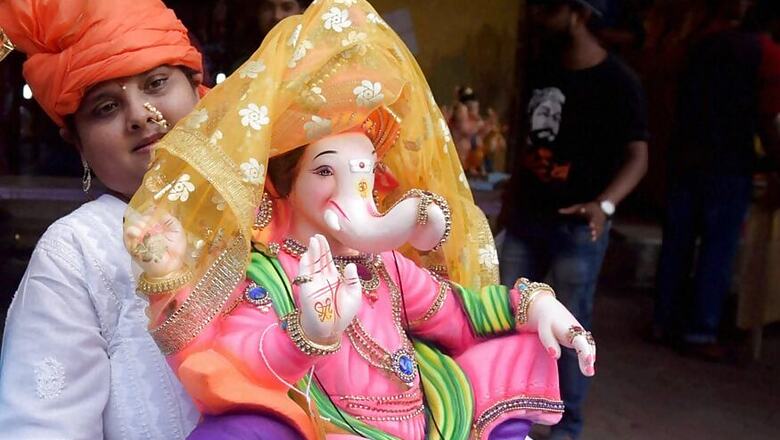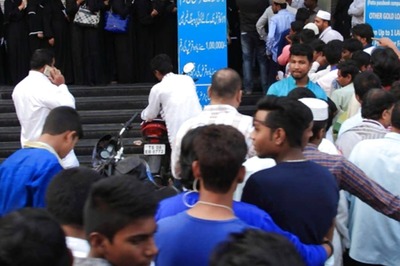
views
Maharashtra gets ready to open its hearts -- and doors -- to welcome the elephant-headed god, the lovable Lord Ganesha, at the start of the 12-day long Ganeshotsav from Friday.
The festival is now in its 125th year since the celebrations were started by the freedom fighter, Lokmanya Bal Gangadhar Tilak, in 1894 to rally the masses during the Independence movement and bypass restrictions by the British rulers.
What started as a modest festival with a small group of people at Keshavji Nayak Chawl in congested Girgaum in south Mumbai has now blossomed into an annual mega-public celebration in Mumbai, the entire Maharashtra, many parts of India and even abroad, with members of all communities taking part.
This year, however, the organisers are somewhat downcast and apprehend that the celebrations may have subdued with curtailment of expenses in many departments, according to top mandal office-bearers.
"On account of the triple whammy of demonetisation, implementation of GST and RERA, our public donations have dropped sharply by more than 50-60 percent this year. This will hamper the pomp and lavishness of the celebrations," Naresh Dahibhavkar, the powerful President of the powerful BrihanMumbai Sarvajanik Ganeshotsav Samanvay Samiti (BSGSS), told IANS.
He confided that besides donations, sponsorships and advertisements for various events connected with Ganeshotsav and social projects have taken a severe hit, besides the recent restrictions on noise pollution.
"If 10 people perform a musical 'aarti' of Lord Ganesh, it touches 70-80 deibels, but the official limit for the festival is only 45 decibelsa I feel many could violate the minimum decibel levels this year and lead to police or court cases," Dahibhavkar rued.
Nevertheless, the organisers are managing to smile through these 'vignas' (adversities) to welcome their popular 'Vignaharta' (Lord Ganesh, the remover of all obstacles).
Around 11,550 big-ticket Ganeshotsav associations, with budgets running into several crores of rupees, 190,000 medium or small organisations with budgets of between Rs 5 million to Rs 500,000, and millions of individual households, shall organise the fest this year in Mumbai, which has a population of around 1.70 crore.
Dahibhavkar said there will be nearly 300 idols in the public marquees within the prescribed height limit of 18 feet.
"However, many mandals plant to install taller idols to commemorate jubilees of their association, or mark some special occasion specific to that organization/locality," he explained.
As usual, some of the biggest idols shall be the famed Lalbaug-cha Raja, Ganesh Gully, Borivali's Kastur Park, Sewri-cha Raja, Andheri-cha Raja, Fort-cha Raja, Khetwadi, Bandra and Shivaji Park and others.
To mark the 125th year, Lalbaug-cha Raja and other major organisations have extended invites to President Ram Nath Kovind, Prime Minister Narendra Modi, union cabinet ministers, governors and chief ministers of various states, foreign dignitaries, celebrities and others, to join the festivities, Dahibhavkar added.
The scenario is ditto in other major centres like Pune, Nagpur, Nashik, Kolhapur and the coastal Konkan region -- where it's the most important festival in the annual calendar, surpassing even Diwali.
Several million people from Konkan working in urban centres like Mumbai, Thane, Navi Mumbai, Pune and other cities started trooping to their homes in the coastal districts since last five days for which the Indian Railways, state government and private operators have made arrangements to ply extra trains, buses and vehicles.
"This year, we have been directly affected by demonetisation and GST, so the celebrations will be substantially hit, but we shall cut down on certain non-essentials to make the best of the situation," said B.N. Uke, a resident of Kelshi beach village in Ratnagiri, famed for the nesting sites of the Olive Ridley turles.
For domestic and foreign tourists, the Maharashtra Tourism Development Corporation has organised special bus tours and walk-tours covering some of the most iconic Ganesh mandals in Mumbai and Pune, Tourism Minister Jaykumar Rawal said.
During the immersion on the final day, special enclosures would be made for the tourists desiring to witness the ceremonies at various beaches and rivers in the two cities, he added.
This year, a controversy has erupted over the origins of public Ganeshotsav with Pune's Shriman Bhausaheb Rangari Ganpati Trust claiming that its founder, Bhau Laxman Jawale had launched it in 1892 and Tilak's celebrations came only after two years.
Amidst rising temperatures, Pune's Guardian Minister Girish Bapat has intervened to say that the festival has evolved into magnificent celebrations due to the combined efforts of both Tilak and Jawale.


















Comments
0 comment